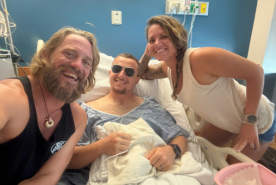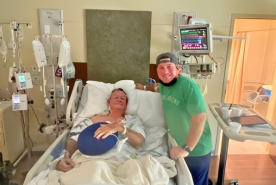Your transplant care team includes a physician, surgeon, coordinator, pharmacist, social worker, dietitian, and financial counselor, plus the National Kidney Foundation.
Good health care is always a team effort—especially for transplant recipients. You and your family are the most important members of the transplant care team. You can take an active role in your care by learning all you can and taking part in your treatment plan. Since each member of the health care staff contributes to your care, it is important for you and your family to work together with them. The rest of the transplant care team includes:
Transplant Surgeon
These doctors have advanced training in surgery (e.g., heart surgery, liver surgery, abdominal surgery, etc.) The surgeon will meet with you before the transplant surgery to determine, with the help of other members of the medical team, whether transplant is the best treatment for you. The surgeon will speak to you about the risks and benefits of the surgery and answer any questions you may have about the surgery or about the follow-up care.
Clinical Transplant Coordinator
Clinical transplant coordinators are the patient’s link to the transplant hospital. Many have backgrounds in nursing, social work or other health-related fields. Clinical coordinators facilitate all aspects of the transplantation process. Their responsibilities include: educating patients and families about various treatment options and answering any questions they may have, evaluating living donors and recipients and coordinating post-transplant follow-up.
Transplant Dietitian
Renal dietitians have specialized degrees in dietetics and must meet certain education requirements to be registered dietitians (RDs). They know what foods are right for you, and they can help you plan your meals. Following a diet is an important part of your care, both before and after receiving a transplant. Renal dietitians are skilled in tailoring your diet to meet your unique needs. This may be especially important if you need to lose weight to become eligible to receive a transplant. They are also involved in the overview of bone management, rehabilitation, and anemia management.
The National Kidney Foundation
The National Kidney Foundation is also a valuable member of the health care team. Besides supporting research to find a cure for kidney disease, the Foundation is a valuable resource in the community for information about kidney transplantation and its follow-up care, diet and rehabilitation. The Foundation has local affiliates throughout the country that offer a wide variety of programs and services for patients who have kidney transplants. Check your local telephone directory for the office nearest you or call toll free: 800-622-9010.

















